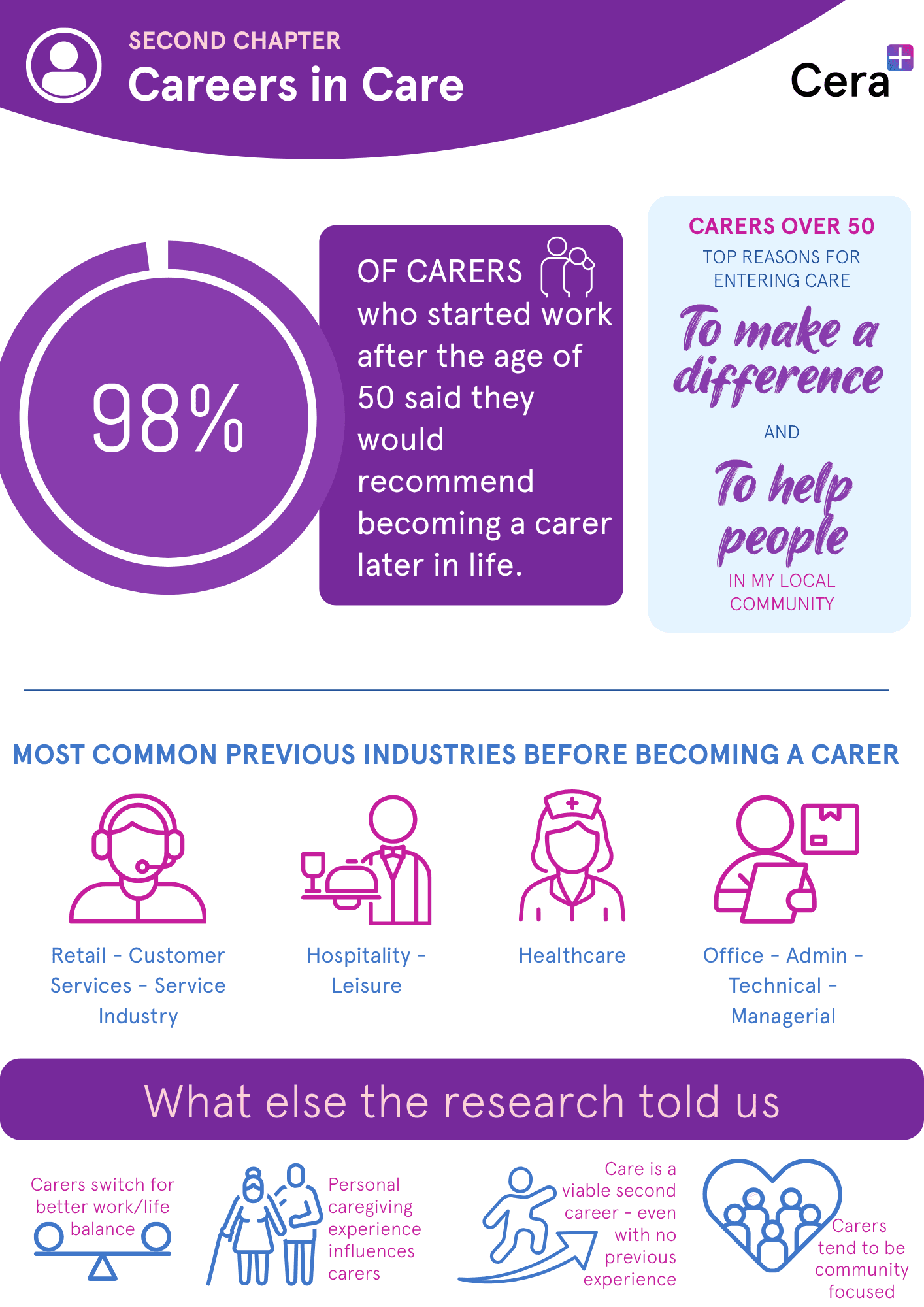Your Second Chapter: A Fulfilling Career in Care After 50
For people over 50 seeking a new job, considering a new start or simply a change of pace, care assistant roles offer a rewarding career option. Care worker roles are ideal for mature people looking for a change of job, or a part-time role after semi-retiring.
A change of life circumstances often triggers a career change. In a recent survey, 41% of our carers who started working in care after the age of 50 did so for a change of career or through redundancy, and another 41% did so as they were seeking more flexibility or part-time work.
Care assistant roles suit older workers so well as older people bring extensive life experience. They tend to have compassion and empathy for those in need of care, often after having cared for their own elderly relatives or looked after a growing family.
In the care sector we value the practical life experience that older workers can bring, making care an excellent choice for a second career.
And it’s getting more and more popular. People in their 50s and 60s are turning to the care sector for work in a society where older workers can sometimes feel written-off. Nowadays, workers are unlikely to pursue just one job or career, so many of us face re-assessing our careers later in life.
**A study by the Co-op in 2017 found that more than half of over 50s have at least three careers. **
Starting a job in a brand new sector and adopting more flexible ways of working are now the norm.
Switching jobs later in life may bring with it concerns about adapting to change and worries about age discrimination, but many people are discovering the immense rewards of a second career in care, bringing their transferable skills to a sector that truly values them.

** It’s changed my life in every way. I wish I’d done it years ago.**
No Experience? No Problem!
One of the most common misconceptions about starting a job as a carer is that you need prior care experience. This couldn't be further from the truth! Companies like Cera are dedicated to supporting new carers, providing a full training programme and on-the-job mentoring from an experienced colleague.
Tracy, one of our carers in Halton was in retail management for 11 years before finding her calling in care. She went into care because she wanted people to receive the same kind of care her Dad had received from his carers.
Sue, another carer in Halton, was made redundant after 28 years working for Cadbury’s. She was 57 when she was made redundant and she was retired for about 10 months before realising she needed to go back to work. Despite not being too sure at first, Sue found she had an aptitude for care, having already nursed her father through a stroke and her sister through recovery from a brain tumour.
In a survey of our carers who started working as care assistants and support workers after the age of 50, 98% said they would recommend becoming a carer later in life.
Many older carers are drawn to care work by a desire for meaning and purpose, with 63% in our survey citing community-minded motivations like "making a difference" or "helping others."
Your willingness to learn and your compassionate spirit are what truly matters.
In care, your life experience is your superpower
If you're over 50, you've accumulated a wealth of life experience, and this is incredibly valuable in a role as a care worker or healthcare assistant. You can bring:
- Empathy
- Understanding
- Self-motivation
- Practical know-how
Once you’ve lived a bit, it’s likely you’ve already…
- calmed someone who’s upset or confused
- cooked someone’s tea
- dealt with the odd crisis
- and done a fair bit of laundry!
You can bring a confidence to the role that you didn’t know you had! And your empathetic approach can make a profound difference to those you support.
Later in life you’re bound to have already navigated some of life's challenges, raised families, or built careers – these experiences translate directly into exceptional caregiving.
Maureen, who started out in care at 62 after 20 years at BT, found it to be the "best job I’ve ever done," and gets a lot out of it.
Her career in customer care - including working with elderly customers to get them the accessible equipment they needed - gave her a great starting point for training as a carer.
Flexibility to Fit Your Lifestyle
No need to worry about rigid schedules. The care sector often offers a lot more flexibility than a 9-5, allowing you to work part-time or on shifts that suit your lifestyle. This means you can find a balance that works for you, whether you're looking for a few hours a week or a more substantial role to keep you busy. Maureen, for example, enjoys doing ‘teas and beds’ and starts work at 3pm, fitting care work around her personal preferences.
Why care could be your most fulfilling career move yet
Beyond personal fulfillment, a career in care allows you to make a tangible impact on your local community. Cera, as a pioneer in growing the care talent pool, is committed to employing over 50s, recognising the contribution they can make. At Cera you'd be part of a team that's making people’s lives better whilst being actively involved in your community.
In a survey of our carers who are over 50, the most liked aspects of their job included:
- Helping people: This was the most frequent response, indicating that our carers who are over 50 have a strong desire to assist others.
- Making a difference: Many carers find satisfaction in knowing they are positively impacting on the lives of their clients.
- The service users: Building relationships and interacting with a variety of clients is a significant source of enjoyment for many.
If you're ready for a rewarding "second chapter" where your life experience is celebrated and your work makes a genuine difference, consider a career in care. It might just change your life in every way!
More about working in care

Careers in care: Love what you do!
For many, this time of year makes you think of connection, compassion, and people who make our lives much better.
Helping Older People Beat the January Blues
For many older people, January can be one of the loneliest months of the year.

